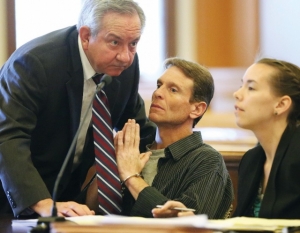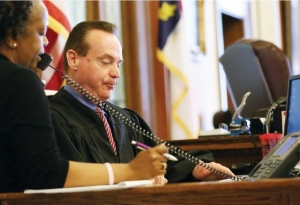DNA tests are back, but not a final ruling
By Kenneth Fine
Published in News on April 3, 2015 1:46 PM

News-Argus/CASEY MOZINGO
Eric Lane, center, sits between his lawyers during a hearing in Courtroom 1 of the Wayne County Courthouse Thursday afternoon. Lane is serving a death sentence in connection with the 2005 murder of 5-year-old Precious Whitfield. His defense team is challenging that conviction.

News-Argus/CASEY MOZINGO
Judge Arnold Jones waits to speak on the phone with the warden of Central Prison in Raleigh to make sure arrangements could be made if additional DNA was required from Eric Lane.

Precious Whitfield
The results of a court-ordered DNA analysis of several pieces of evidence collected by Wayne County investigators more than a decade ago brought the legal team of a convicted murderer one step closer to having what they consider a critical question answered without a shadow of a doubt.
Experts at Sorenson Genomics in Salt Lake City, Utah, were able to create a DNA profile using bodily fluids extracted from biological evidence that was not tested in 2002 as lawmen built their murder case against Eric Glenn Lane -- the man ultimately convicted, three years later, of kidnapping, raping and killing 5-year-old Precious Whitfield.
And when that profile is compared to the fresh DNA sample Lane will provide to Sorenson in the coming weeks, his attorney, Michael Unti, believes it will show that his client did not sexually assault the little girl before she died -- a revelation he believes would prompt Senior Resident Superior Court Judge Arnold Jones to, at the very least, order a new trial, and, in the best-case-scenario, set Lane free.
Jones, after reviewing the results from Sorenson and listening to arguments from both Unti and Nicholas Vlahos, a representative from the state Attorney General's Office, ordered a new round of testing Thursday -- one that will ask analysts to compare the DNA found on the biological evidence to Lane's.
And the new court order, which he will sign Monday, requires Sorenson to complete the testing as soon as possible -- so that if it excludes Lane as the person who raped Precious, Jones can move forward with the death row inmate's motion for appropriate relief in a timely fashion.
The Lane case began May 17, 2002, when a little girl never came home from her bike ride.
Precious' body would ultimately be discovered by fishermen two days later in Nahunta Creek, wrapped in a trash bag that had been secured in a blue tarp -- her bicycle not far away.
And when witnesses told investigators they had seen a white man on a red scooter carrying a tarp-covered bundle near the intersection of Big Daddy's Road and Lancaster Road the night Precious went missing, lawmen zeroed in on Lane.
A red scooter with blue fibers on it was found inside Lane's home.
Lane would later confess -- both orally and in writing -- to raping and killing the 5-year-old.
But Glenn Barfield, Lane's former attorney, said earlier this year that he was not concerned about the confession as it related to a possible vindication of his former client.
"There are real questions about that statement," he said, adding that confessions existed in a dozen or more death row cases that have been overturned by DNA evidence in recent years. "In none of those cases was the existence of a confession a real issue."
Just when the results of the DNA test will return to Wayne County -- and what they will reveal -- are unknown.
In fact, the only person in Courtroom No. 1 Thursday who knows whether Lane did, in fact, commit the crime, is the death row inmate, himself.
But Jones said he believes the new test he has ordered will be expedited without "sacrificing quality for speed" -- that by mid-summer, the answer to the DNA question will have been answered.
Should the results point to Lane, it would seal the fate a judge and jury levied on him nearly a decade ago -- death by lethal injection.
And if the DNA collected from the biological evidence does not match his, a hearing where his motion for appropriate relief would be heard, will unfold.
Unti seems confident that Lane's DNA will not match the evidence extracted by Sorenson earlier this year.
"We have a pretty good hunch," he said in January. "We'll just say that much."
And Thursday he took it a step further -- asking Jones to order that, in the event the DNA samples were not a match, a search for the true culprit begin.
